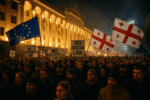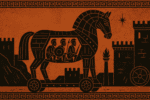The Georgian opposition is a broad coalition of political parties, civil society groups, and grassroots activists. These actors are united by a shared goal: challenging the ruling Georgian Dream party’s growing authoritarian tendencies, allegations of corruption, and perceived tilt toward Russian interests. In contrast, the opposition advocates for democratic reforms, greater transparency, and deeper integration with the European Union (EU) and NATO.
Over recent years, the opposition has gained momentum through large-scale protests across Tbilisi and other cities. These demonstrations often erupt in response to controversial legislation, electoral disputes, or government actions perceived as undermining democratic freedoms. However, despite growing public support, the movement faces serious challenges. Internal divisions, limited resources, and sustained state repression all threaten to undermine its progress.
To succeed in the long term, the opposition must unify its leadership, expand its base, maintain a disciplined nonviolent stance, and leverage international advocacy. This will be crucial for countering government narratives, resisting repression, and keeping democratic aspirations alive.
Understanding the Opposition’s Current Position

The protests of late 2024 underscore the stakes for Georgia’s political future. Triggered by the suspension of EU accession talks, these demonstrations have drawn tens of thousands of people into the streets. Protesters demand a return to a pro-European path, accountability for police violence, and the protection of independent journalism.
Despite the scale of these demonstrations, the opposition’s internal divisions remain a barrier to success. Factional rivalries and competing leadership claims dilute the movement’s effectiveness. Without a cohesive strategy, public enthusiasm may fade, giving the ruling party room to consolidate its position.
Seven Strategic Priorities for Sustaining Momentum
To sustain pressure and achieve meaningful reform, the Georgian opposition should adopt a coordinated, adaptive strategy built around seven core priorities:

1. Unify Leadership
A fractured opposition benefits only the ruling government. By establishing a credible and inclusive leadership structure, the opposition can present itself as a viable alternative to Georgian Dream. This requires compromise among leaders, transparent decision-making, and the creation of a common policy platform that appeals to a broad cross-section of society.
2. Broaden Engagement
Mobilization efforts should extend beyond the urban middle class. To build a durable movement, the opposition must actively involve youth groups, professionals, and rural communities. Outreach programs, local assemblies, and targeted messaging can help bridge the gap between city-based activism and rural concerns.
3. Maintain Nonviolent Discipline
Nonviolent discipline is essential for maintaining both domestic legitimacy and international support. Escalating into violence would risk alienating moderate supporters and give the government justification for further crackdowns. Training programs on peaceful protest tactics and legal rights can help participants remain disciplined under pressure.
4. Leverage International Advocacy
The opposition should intensify its engagement with global democratic institutions. Building relationships with the EU, NATO, the United Nations, and international human rights organizations can increase pressure on the Georgian government. Coordinated outreach to foreign media and policymakers ensures that Georgia’s democratic crisis remains visible worldwide.
5. Communicate Strategically
Clear, relatable messaging is essential for sustaining public interest. The opposition must counter disinformation campaigns by using a mix of digital platforms, traditional media, and community outreach. Consistent narratives about corruption, governance failures, and democratic principles can help keep supporters engaged and informed.
6. Target Vulnerabilities
The Georgian Dream government faces criticism over corruption, economic stagnation, and governance failures. The opposition should focus on these weaknesses by presenting evidence, highlighting scandals, and connecting policy failures to the public’s daily struggles. This targeted approach erodes the ruling party’s legitimacy and builds momentum for change.
7. Ensure Resilience
Government crackdowns are a constant risk. The opposition must develop decentralized networks capable of operating even if leaders are detained or communications are disrupted. Secure messaging platforms, local organizing hubs, and contingency leadership plans are vital for maintaining operations during repression.
International Response to the Georgia Protests
The late 2024 protests have attracted widespread international attention. Several key events and official statements illustrate the global stakes in Georgia’s political struggle.

1. EU Condemns Police Brutality and Considers Sanctions
Reuters reported on December 9, 2024, that the European Union is weighing sanctions against Georgia. This follows violent clashes between police and demonstrators. Pawel Herczynski, the EU Ambassador to Georgia, described “unacceptable” levels of police brutality against protesters opposing the suspension of EU accession talks. This potential sanctions discussion signals that Brussels is prepared to apply real pressure if democratic norms continue to be violated.
2. Journalists Report Violence and Intimidation
According to the Associated Press on December 8, 2024, journalists covering the protests have faced brutal beatings and threats. These incidents highlight a growing climate of fear for independent media. Press freedom is a critical issue for Georgia’s democratic credibility, and attacks on journalists undermine both domestic trust and international reputation.
3. UK Reduces Engagement with the Georgian Government
On December 9, 2024, Reuters reported that the United Kingdom will limit engagement with the Georgian government. This includes restricting defense cooperation due to ongoing violence against protesters and media personnel. The UK’s stance demonstrates that continued repression will carry diplomatic costs and strain Georgia’s Western alliances.
4. Germany, France, and Poland Issue Joint Condemnation
The Associated Press noted on December 7, 2024, that Germany, France, and Poland jointly condemned the use of force against peaceful protesters. Their foreign ministers called for the protection of fundamental rights and demanded the release of detained opposition members. This unified stance from three major EU countries adds further legitimacy to the opposition’s cause.
5. Financial Times Warns of Escalating Tensions
In a December 5, 2024, analysis, the Financial Times drew parallels between Georgia’s crisis and past events in Ukraine. The article emphasized the risks of escalation if EU accession talks remain suspended and democratic freedoms continue to erode. The piece suggests that Georgia could face prolonged instability without political compromise.
Why International Pressure Matters
Georgia’s geographic position and political alignment make it strategically important. International support—or the lack of it—will significantly influence the government’s calculus. If global actors apply consistent pressure through sanctions, reduced cooperation, and diplomatic isolation, it could encourage meaningful reforms. Conversely, weak or inconsistent responses may embolden authoritarian tendencies.
The Road Ahead for the Georgian Opposition
The Georgian opposition’s path forward is challenging but not impossible. Consistent, strategic action must be combined with adaptability. The movement’s ability to respond to government tactics, mobilize new supporters, and maintain international attention will determine its success.
If the opposition can unify around a shared vision, build coalitions that cut across societal divides, and demonstrate responsible governance alternatives, it stands a real chance of influencing Georgia’s political trajectory.
Conclusion: Turning Protest into Political Change
The Georgian protests of 2024 are more than a reaction to one policy decision—they are a test of the country’s democratic resilience. The opposition has an opportunity to transform public anger into lasting political reform. By unifying leadership, expanding grassroots engagement, and leveraging both domestic and international support, they can keep the movement alive despite repression.
International actors, from the EU to individual states, play a critical role in supporting these efforts. Sustained diplomatic pressure, combined with clear signals of support for democratic movements, can help tip the balance toward reform.
The fight for Georgia’s democratic future is still unfolding. The coming months will reveal whether the opposition can maintain momentum, counter state repression, and steer the country back toward a path of democratic governance and European integration.
DISCLAIMER: Links included might be affiliate links. If you purchase a product or service with the links that I provide I may receive a small commission. There is no additional charge to you.





Leave a Reply